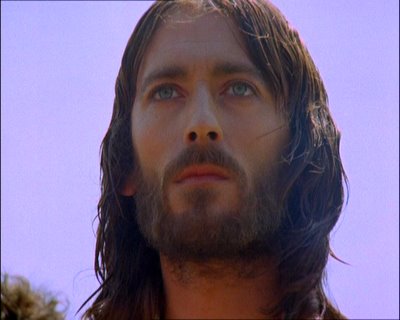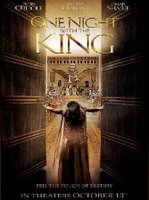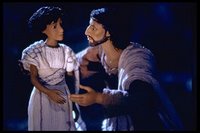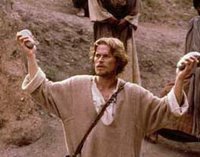 I want to use a clip to illustrate Luke's portrayal of Jesus' rejection in Nazareth (Luke 4:16-30). Luke is the only gospel to depict Jesus reading a particularly apt text from Isaiah which narrows my focus somewhat. Whilst a few more versions of this episode are out there I'm going to focus on those below as the quality of the other films overall is too poor to make them a serious possibility. So these are those listed in Staley and Walsh from which I will also cite start times and chapters in brackets (Region 1). The unbracketed timings are my own (Region 2). I've excluded Pasolini and Saville's films here as they are based on the accounts in Matthew and John respectively. I've also included the scene from Mary, Mother of Jesus which is not included in Staley and Walsh's book.
I want to use a clip to illustrate Luke's portrayal of Jesus' rejection in Nazareth (Luke 4:16-30). Luke is the only gospel to depict Jesus reading a particularly apt text from Isaiah which narrows my focus somewhat. Whilst a few more versions of this episode are out there I'm going to focus on those below as the quality of the other films overall is too poor to make them a serious possibility. So these are those listed in Staley and Walsh from which I will also cite start times and chapters in brackets (Region 1). The unbracketed timings are my own (Region 2). I've excluded Pasolini and Saville's films here as they are based on the accounts in Matthew and John respectively. I've also included the scene from Mary, Mother of Jesus which is not included in Staley and Walsh's book. Greatest Story Ever Told (1965)
From 1:33:30 (1:36:51)
Instead if shooting this scene from inside a synagogue, Stevens films out in the open air, next to a pool where a number of people have gathered. There are quotes from all 4 gospels, but particularly John (e.g. 10:24), and the critical quotations from Luke. When the confrontation is over Jesus walks away with his back to the camera and we see someone throw a stone at him that hits him squarely on the back
Jesus of Nazareth (1977)
From episode 2 10:33 (1:43:00)
This takes the scene almost directly from Luke alone. There are a few dramatic flourishes, but the location of this clip (right at the start of Jesus' adult ministry) and its inclusion of the fulfilled OT prophecy both suggest Luke. After Jesus has made his statement, Mary repeats the key phrase "today in our hearing the scriptures are fulfilled". We also see Jesus being ejected from the temple and there's a similar shot of Jesus' back as was found in Greatest Story. This time however no stone is actually thrown. This is certainly the version that came to mind when I started thinking of portrayals of it and so I may well use this one.
Jesus (1979)
From 13:00(0:15:11)
This film is an adaptation of Luke so it's not surprising to find that it's the one that most closely corresponds to that gospel. We see Jesus sitting on the floor and covering his head and kissing the scriptures before reading them. The wording here is pretty much as per the gospel. It even includes Jesus being brought to the cliff edge though whilst the narrator describes Jesus walking through the middle of the crowd we only see him walk away from them.
Mary, Mother of Jesus (1999)
From 0:56:55
This film is usually pretty dreadful, but Bale is capable of turning any scene into something memorable so I thought this might be worth a try. And so it turned out. There's a bit of an underemphasis on the words Jesus speaks, but a few nice touches. For example, as Jesus is reading from the scroll another man moves a pointer along the text to help him keep his place. When Jesus begins to close the scroll in the middle of a section the man gives Jesus a shocked look. The confrontation that ensues goes on quite a bit, but it's still a fairly good scene. There's also a visual nod to Jesus of Nazareth as we see Jesus in the synagogue from behind the screen that separated off the women.
Overall it's interesting that other than Greatest Story all these portrayals are keen to show Jewish customs relating to synagogues. All 3 of these other films also join up the dots for the audience by explaining that Jesus was claiming to be the messiah.



































